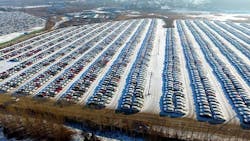China to Relax Foreign Car Venture Limit in Orderly Manner
China has provided the clearest indication to date that it plans to lift the cap on how much foreign carmakers can own of their local joint ventures, putting pressure on Chinese carmakers to speed up the building of their own brands.
In a joint release on Tuesday, the National Development and Reform Commission together with the science and industry ministries laid out a development blueprint for the country’s auto industry covering the years through 2025. The government will “open up the restriction on joint venture ownership in an orderly manner,” according to the plan, which didn’t provide details of how the liberalization will be carried out or provide a timeline.
Most Chinese automaker shares rose, led by BMW AG’s Chinese partner Brilliance China Automotive Holdings Ltd., on speculation some companies may choose to sell their stakes in the joint ventures to their foreign partners once the cap is lifted.
50:50 Rule
The so-called “50:50 rule” -- named after the 50% limit that foreign companies can own of their Chinese joint ventures -- has for years been a sacred cow for the auto industry, seen as necessary to buy local carmakers time to gain the technology and build their brands before giving overseas carmakers unfettered access to what’s now the world’s biggest car market.
That began to change in 2014 when a Chinese commerce ministry official suggested in a public forum that local carmakers should prepare for the day the rule will be eased. The prospect of allowing the likes of General Motors Co. and Volkswagen AG to own all of their operations in China prompted the then-head of the state-backed China Association of Automobile Manufacturers to remark that Chinese brands would be “killed in the cradle.”
Trade Talks
Most recently, China was ready to relax the policy during President Xi Jinping’s visit to Florida earlier this month for a summit with Trump, according to Bloomberg BNA. Bloomberg News reported in June that China’s government was considering loosening the policy that has long been criticized for shielding state-owned companies from competition.
While Tuesday’s development plan didn’t include a specific timeline on when the ownership restriction will be opened, or whether it will be a gradual opening up or complete lifting of the cap, it’s the first official mention in writing that the government will ease the limit.
“My opinion on this has been that over the long run the restriction on stake cap will be lifted,” said Dong Yang, vice chairman of CAAM, after attending a meeting organized by the industry ministry to discuss the plan. “But it won’t work if we remove it immediately and that is what ‘orderly’ means.”
Less than half the record 23.9 million cars, sport utility vehicles and minivans sold in China last year were from local nameplates. Market share for Chinese-brand cars has stayed fairly constant, reaching 43% last year from 41% a decade ago, according to the state-backed manufacturers association.
Not Strong Enough to Stand Alone
While China’s homegrown brands have gained more market recognition, the country’s automakers are still not strong enough and lack sufficient core technologies, MIIT said in the statement. The government aims to boost sales of new-energy vehicles to more than 20% of the country’s overall market by 2025 as well as nurture several local automakers that can make their way to the top 10 global manufacturers of such autos by 2020, according to MIIT.
Foreign companies often prop up their domestic partners to help them stay in business and keep the assembly lines rolling, said Jochen Siebert, the Singapore-based managing director of JSC Automotive Consulting. If the cap is lifted, some partnerships would take years to unravel as the parties haggle over the price. Yet carmakers owned by local governments may dissolve their marriages quickly so officials can use the proceeds to invest in ventures such as improving public transportation, Siebert said.
Volkswagen: 'A Positive Signal'
Volkswagen will examine if there are new opportunities in China, while it doesn’t see any changes for current joint ventures in the country, the automaker said in an emailed statement. “Every step to liberalize the Chinese economic area is a positive signal -- especially when it affects the future market for e-mobility,” it said.
Brilliance, whose shares rose the most in three weeks in Hong Kong, didn’t immediately respond to an emailed request for comment. A spokeswoman at BMW China didn’t immediately reply to an email seeking comment.
Representatives for Nissan Motor Co., Ford Motor Co. and SAIC Motor Corp. couldn’t immediately comment. Hyundai Motor Group said it has no immediate comment on the plan. Toyota Motor Corp. said it isn’t in a position to comment.
By Bloomberg News
About the Author
Bloomberg
Licensed content from Bloomberg, copyright 2016.
